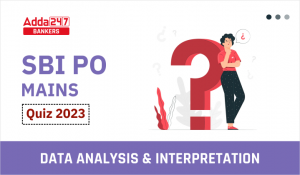Q1. The EBRD is an international financial institution. EBRD stands for-
(a) European Basel for Reconstruction and Development
(b) European Bank for Reconstruction and Department
(c) European Bank for Reconstruction and Development
(d) English Bank for Reconstruction and Development
(e) European Basic for Reconstruction and Development
S1. Ans.(c)
Sol. The European Bank for Reconstruction and Development (EBRD) is an international financial institution founded in 1991.
Q2. Where is the Head Office of EBRD?
(a) Rome
(b) Vienna
(c) Berlin
(d) Geneva
(e) London
S2. Ans.(e)
Sol. The European Bank for Reconstruction and Development is an international financial institution founded in 1991. As a multilateral developmental investment bank, the EBRD uses investment as a tool to build market economies. The Head Office of EBRD is in London, UK.
Q3. IIB is a multilateral institution for development that promotes social and economic development, prosperity, and economic cooperation between its member states. IIB stands for-
(a) International Investment Bank
(b) International Indian Bank
(c) International Installment Bank
(d) International Institution Bank
(e) International Important Bank
S3. Ans.(a)
Sol. The International Investment Bank (IIB) is a multilateral institution for development that promotes social and economic development, prosperity, and economic cooperation between its member states. Main directions for its activities are the support of the small and medium-sized businesses and participation in financing socially significant infrastructure projects. The Bank provides loans primarily through leading domestic publicly owned financial institutions, development banks, export and import banks and agencies, or lends in partnership with other international institutions for development.
Q4. African Development Bank is coordinating the implementation of an integrated development strategy for Portuguese-speaking countries in Africa. In which among the following year African Development Bank was founded?
(a) 1984
(b) 1977
(c) 1972
(d) 1963
(e) 1967
S4. Ans.(d)
Sol. The African Development Bank (AfDB) Group is a regional multilateral development finance institution established to contribute to the economic development and social progress of African countries that are the institution’s Regional Member Countries (RMCs). The AfDB was founded following an agreement signed by member states on August 14, 1963, in Khartoum, Sudan, which became effective on September 10, 1964. The AfDB comprises three entities: the African Development Bank (ADB), the African Development Fund (ADF) and the Nigeria Trust Fund (NTF).
Q5. Where is the head office of African Development Bank?
(a) Ouagadougou
(b) Abidjan
(c) Porto-Novo
(d) Accra
(e) Bamako
S5. Ans.(b)
Sol. The head office of African Development Bank is in Abidjan, Cote d’Ivoire.
Q6. Which of the following rates is decided by the market conditions and not by RBI?
(a) Bank rate
(b) SLR
(c) CRR
(d) Inflation rate
(e) MSF
S6. Ans.(d)
Sol. Inflation rates is decided by the market conditions.
Q7. Proposals for setting up of new banks are under active consideration. Which organization gives this permission?
(a) RBI
(b) Indian Banks Association
(c) Finance Ministry
(d) Cabinet Committee on Economic Affairs
(e) SEBI
S7. Ans.(a)
Sol. Reserve Bank of India gives permission to Proposals for setting up of new banks are under active consideration.
Q8. Basel norms are important international regulatory stipulations. It is meant for which sector?
(a) Insurance
(b) Banking
(c) Micro Finance
(d) Pension funds
(e) Trade
S8. Ans.(b)
Sol. Basel guidelines refer to broad supervisory standards formulated by these groups of central banks– called the Basel Committee on Banking Supervision (BCBS).
Q9. Which of the following institutions is not directly associated with the financial sector in India?
(a) Bombay Stock Exchange
(b) BIFR
(c) SEBI
(d) Planning Commission
(e) IBBI
S9. Ans.(d)
Sol. Planning Commission.
Q10. Which discussing investments there is mention of short term government security. What is this type of investment known as?
(a) Debenture
(b) Mutual fund
(c) Treasury bill
(d) Share
(e) None of the given options is true
S10. Ans.(c)
Sol. Treasury Bills are short-term (up to one year) borrowing instruments of the Government of India which enable investors to park their short-term surplus funds while reducing their market risk.
Q11. ___________ is a cheque clearing system undertaken by the Reserve Bank of India (RBI) for faster clearing of cheques.
(a) IMPS
(b) CBS
(c) NPCI
(d) CTS
(e) NFS
S11. Ans.(d)
Sol. Cheque Truncation System (CTS) is a cheque clearing system undertaken by the Reserve Bank of India (RBI) for faster clearing of cheques.
Q12. NFS is the largest network of shared automated teller machines in India. What is the full form of NFS?
(a) National Financial Switch
(b) National Financial Service
(c) National Financial System
(d) National Financial Security
(e) National Financial Solutions
S12. Ans.(a)
Sol. National Financial Switch is the largest network of shared automated teller machines in India. It was designed, developed and deployed by the Institute for Development and Research in Banking Technology (IDRBT).
Q13. What is the meaning of “T” in CTS?
(a) Target
(b) Transport
(c) Transfer
(d) Timing
(e) Truncation
S13. Ans.(e)
Sol. CTS stands for Cheque Truncation System.
Q14. What is the silent features of NFS?
(a) NFS has introduced sub-membership model which enables smaller, regional banks including RRBs and local co-operative banks to participate in the ATM network.
(b) NFS has maintained high standards of application and network uptime of above 99.50% which has helped our member banks ensure enhanced customer experience.
(c) The Dispute Management System (DMS), has benefitted members with high operational efficiency and ease of online transaction life cycle management (chargeback, representment, etc.) in the network apart from being compliant with local regulatory requirements.
(d) The Fraud Risk Management (FRM) solution is offered as a value added service to monitor transactions (in real time) and to generate alert or decline the transaction in the NFS network
(e) All of the above are silent features of NFS
S14. Ans.(e)
Sol. Salient Features of NFS are given below:-
1. NFS has introduced sub-membership model which enables smaller, regional banks including RRBs and local co-operative banks to participate in the ATM network.
2. NFS has maintained high standards of application and network uptime of above 99.50% which has helped our member banks ensure enhanced customer experience.
3. The Dispute Management System (DMS), has benefitted members with high operational efficiency and ease of online transaction life cycle management (chargeback, representment, etc.) in the network apart from being compliant with local regulatory requirements.
4. NPCI has also tied up with International card schemes like Discover Financial Service (DFS), Japan Credit Bureau (JCB) and China UnionPay International (CUPI) which allows their cardholders to use ATMs connected to NFS network.
5. The Fraud Risk Management (FRM) solution is offered as a value added service to monitor transactions (in real time) and to generate alert or decline the transaction in the NFS network.
Q15. _____________ is a bank led model which allows online interoperable financial transaction at PoS (Point of Sale/Micro ATM) through the Business Correspondent (BC)/Bank Mitra of any bank using the Aadhaar authentication.
(a) UPI
(b) NFS
(c) AEPS
(d) NACH
(e) CTS
S15. Ans.(c)
Sol. AePS is a bank led model which allows online interoperable financial inclusion transaction at PoS (MicroATM) through the Business correspondent of any bank using the Aadhaar authentication. AePS allows you to do six types of transactions.






 Quantitative Aptitude Quiz For SBI PO Ma...
Quantitative Aptitude Quiz For SBI PO Ma...
 Inequalities Basic Reasoning Quiz for Al...
Inequalities Basic Reasoning Quiz for Al...




